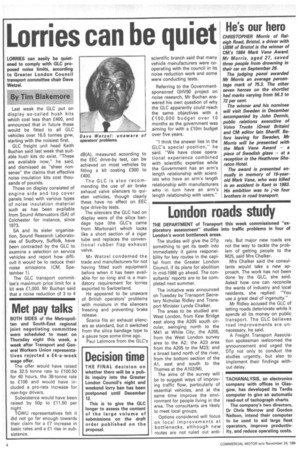London roads study
Page 6

If you've noticed an error in this article please click here to report it so we can fix it.
THE DEPARTMENT of Transport this week commissioned "exploratory assessment" studies into traffic problems in four of London's worst bottleneck areas.
The studies will give the DTp something to get its teeth into immediately it gains responsibility for key routes in the capital from the Greater London Council, if its plans for abolition in mid-1986 go ahead. The consultants' reports are to be completed next summer.
The initiative was announced on Tuesday by Transport Secretary Nicholas Ridley and Transport Minister Lynda Chalker.
The areas to be studied are: West London, from Kew Bridge east along the A205 south circular, swinging north to the M41 at White City; the A205, from the West London survey area to the A2; the A23 area from the A205 to the M23; and a broad band north of the river, from the bottom section of the Al, east and south to the Thames at the A102(M).
The aims of the survey will be to suggest ways of improving traffic flow, particularly of essential vehicles, and at the same time improve the environment for people living in the area. The consultants are likely to meet local groups.
Options considered will focus on local improvements at bottlenecks, although new routes are not ruled out enti rely. But major new roads are not the way to tackle the problem of getting people to the M25, said Mrs Chalker.
Mrs Chalker said the consultants would take a new approach. The work has not been done by the GLC, she said. Asked how one can reconcile the wants of industry and local residents, she replied: "You use a great deal of ingenuity."
Mr Ridley accused the GLC of letting roads deteriorate while it spends all its money on public transport. The GLC believes road improvements are unnecessary, he said.
A Freight Transport Association spokesman welcomed the announcement and urged the DTp not only to conduct the studies urgently, but also to implement their findings without delay.
TACHANALYSIS, an electronics company with offices in Glasgow, has developed its Tardis computer to give an automatic read-out of tachograph charts.
The company's two directors, Dr Chris Morrow and Gordon Neilson, intend their computer to be used to aid large fleet operators, improve productivity, and reduce operating costs.
































































































